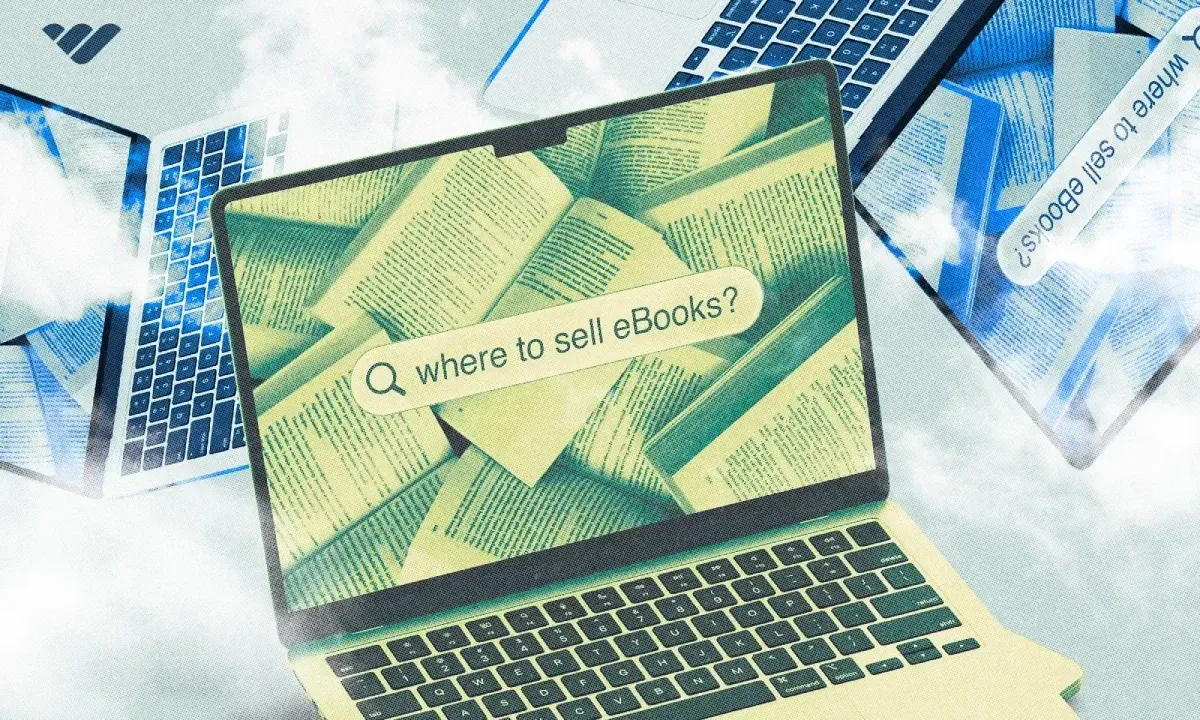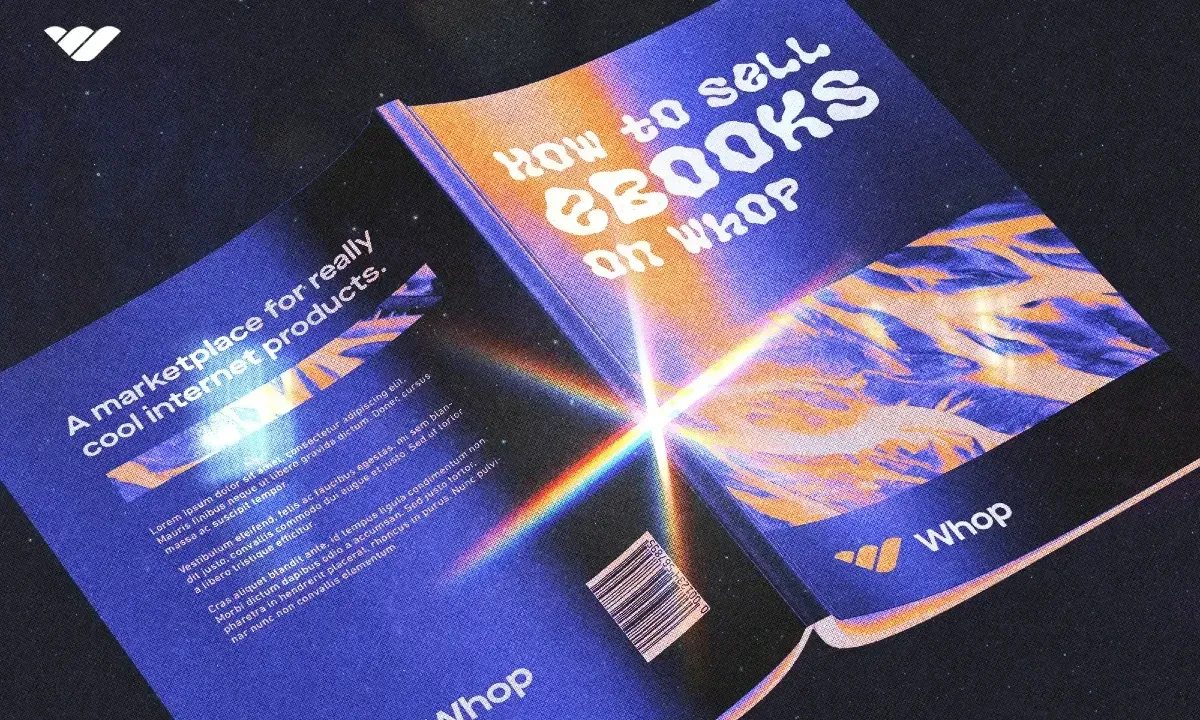Books have the power to change your way of thinking. They allow you to explore various global cultures, they expand our minds, and make us feel like we have the world at our fingertips. Non-fiction books, in particular, equip you with theoretical knowledge, literature, and global occurrences to keep you informed about the current world.
Smart entrepreneurs understand the power of books, and so they join the book industry by selling books online. They choose to sell books on the internet rather than in store, as when you sell books online, you're able to avoid publishers, reduce your business costs, and engage directly with your clients.
But how do you sell books online? Is it best to sell physical, printed works, or are you better off selling ebooks? This guide will answer all of these questions, and demonstrate how simple it is to begin selling your books online. It covers all aspects of selling books, from how you can acquire the books to launching your business.
Jump ahead to:
- Why Sell Books?
- How Can I Sell Books Online?
- Selling Physical Books Online
- Go Fully Digital by Selling Ebooks
- 6 Steps to Selling Books Online
- Selling Books Online With Whop
- Why Choose Whop?
Why Sell Books?

Selling books online is a great way to earn extra income or start a profitable business. In a world filled with TV shows, movies, and social media channels, the enduring appeal of books remains strong for many individuals. Here are 7 reasons to sell books.
1- The Book Industry is Growing
The global book market was valued at $144.67 billion in 2023. It is expected that this value will compound at a rate of 1.8% per year from 2024 until 2030. The market is witnessing increased consumer spending due to continuous innovations that enhance the reading experience. Throughout their history, books have evolved from Papyrus reeds to ebooks, resulting from new technologies and digital media advancements. Consequently, reading moved to electronic devices, widening the scope of the publishing market.
Audiobook sales have also been high in recent years. A 2019 report by the Audio Publishers Association stated that audiobook sales rose by about 25% between 2017 and 2018, with total sales reaching nearly one billion dollars.
2- You Can Be Your Own Boss
Have you ever dreamed of being your own boss and running a business? Selling books is one way to achieve this. When you venture into the bookselling industry, you can make independent decisions and direct your business according to your vision and values. Running a business offers you the flexibility of setting your schedule, defining your business strategies, and creating a work environment that suits your preferences.
3- Diverse Genres = A Huge Market
Selling books is a viable venture due to the diverse product variety. Books come in various genres that appeal to various market segments, boosting demand. In the last five years, books containing adult non-fiction content have witnessed a 22.8% revenue growth. Popular ebook categories are:
- Self Help
- Business and Money
- Cookbooks, food, and Vine
- Biographies and Memoirs
- Religion and Spirituality
Some of the most popular sub-genres that have generated much income in the market include:
- Crime and mystery
- Children and young adult
- Horror
- Science fiction and fantasy books
- Religious/Inspirational
- Romance and erotica
So, there is a place for everyone in the book market.
4- The Opportunity For Financial Freedom
Selling books can be a pathway to financial freedom through profit optimization. A cool advantage of selling books is that you can flip used books. Thrift stores, antique stores, and yard sales give you access to cheap books. You can't compare flipping books to a large-scale venture like flipping houses, but the extra cash increases with an increase in your inventory. The profits you can derive depend on the book's availability, genre, and purchase price. You can enjoy high profit margins from new releases and specialty editions. Moreover, choosing your books correctly allows you to get a decent profit margin compared to your investment capital.
The time you can spend flipping books depends on the efficiency of your methodology and your spare time. Using the right software to search for books can help you save time. Apps like BookScouter can help find books available for sale online. The research process to find books can consume a lot of time, but once you know what to look for, you can maximize your profit margins.
5- Books Have a Timeless Appeal
While technology continues to evolve rapidly, books have a timeless appeal, transcending trends and generations. They offer testaments to findings, perspectives, and experiences. Previous generations have used books as learning instruments, and their conversion over time, from handwritten to print, makes them immortal. Books offer authors a rewarding way to secure a legacy and benefit other individuals from their contents.
Researchers and authors use informative books to gain insights and boost their creativity. Their broad appeal caters to practitioners and non-academics, and researchers can integrate several related topics into their publications. Moreover, their stellar online presence makes them accessible to reading enthusiasts globally.
6- Global Reach
In the current world, everything is digital, including book sales. By selling books online, you can reach a global customer base through technology and the Internet. The presence of ecommerce platforms and the availability of international shipping can allow you to expand your business beyond the local market. By strategically selecting a diverse inventory of books, you can reach various market segments and maximize the potential of your sales.
If you envision taking your book market overseas, the current technology can help you adapt the book cover to various countries. You can research the internet for the tastes and preferences of people in a particular company. Internet resources can help you find out what appeals to readers in various countries, and you can make the needed adjustments.
7- Personal Fulfillment
A business is more likely to be successful if you're passionate about it. Turning your reading hobby into a thriving business allows you to blend your interests with professional pursuits that can lead to a purpose-driven career. You can form connections with fellow book enthusiasts and contribute to the community of readers through your book selections.
Earning an extra income while doing your favorite things is a pathway to personal fulfillment and satisfaction. When you connect readers with their favorite authors and recommend some of the best books to read, you feel a unique level of satisfaction. Moreover, witnessing your customers' joy of discovery can be incredibly rewarding. The ability to impact people's lives positively through the power of storytelling is an aspect you can only get from selling books.
How Can I Sell Books Online?

Now that we have covered the 'why', let's take a look at the 'how' of selling books online.
There are plenty of options available, and in this guide we will explore different ways to sell books. We will cover:
- Selling physical books: both on marketplaces and your own online store
- Going fully digital with ebooks
Whether you're selling books that you've written by yourself or you're selling books from other authors, these are the options to choose from. We'll look at the pros and cons of each option and how you can get started.
Selling Physical Books Online
Online Marketplaces for Selling Physical Books
The first option for selling books is to sell physical books through an online store or marketplace, such as your own eBay, Facebook marketplace, or Amazon. This method allows you to start for free (or at a low cost), and you can even start by selling your old books. Reselling books on Amazon is legal, but your account may be restricted from selling certain authors or publications.
It is pretty simple to find books to sell on Amazon, eBay, or other. You can source used books for pennies on the dollar and sell them online for a profit. Some of the most common places to find used and vintage books are library sales, closing sales (like estate sales or store closing sales), garage sales and thrift stores. You can even get free books by scouring sites like Craigslist.
If you want to sell new books then you can either find books at wholesale rates through suppliers, or, take part in online arbitrage. Arbitrage is finding a product at a low rate then selling it on for a higher rate - so, browse websites that have books at a low cost and increase their prices when you sell them on.
You can also sell your own published works on these book marketplaces, but this comes with hefty fees. To create and sell a physical printed book, you must take into account the costs associated with finding a publisher (or self publishing), printing, and storing inventory.

The good thing about using an online marketplace to sell physical books is that you are selling to an existing audience. There is already a huge group of people actively searching for books on Amazon, eBay, and Facebook marketplace, so eventually you will find a buyer.
However, there are the downsides associated with selling books this way. Firstly, there is the cost of shipping, handling, and inventory. In order to sell physical books you must have them ready to ship, and buying and storing stock can be costly.
Then, there are the platform fees. Most platforms, including Amazon, will charge you a fee to sell on their website. For the sake of this article, let's imagine that you are selling books on Amazon.
- When you become a bookseller on Amazon, you can create a professional or individual seller account. If you register as a professional seller, you pay a monthly subscription fee of $39.99. If you are an individual seller, the only fee you pay is $0.99 per item you sell.
- Another fee Amazon charges is the referral fee. Here, Amazon deducts 15% of your sale price. Since your focus is selling books, you're subject to a flat fee of $1.80 on each sale, known as the closing fee. Furthermore, Amazon offers two types of seller plans: Fulfillment by Amazon (FBA) or Fulfillment by Merchant (FBM).
- As an FBM seller, you're responsible for shipping your sales. If you're an FBA seller, Amazon ships your products and charges you an FBA fee. Additionally, the company charges you a monthly storage fee if any of your products have to be installed in their warehouses.
If you don't want to give up 15% plus $1.80 Amazon, you can try selling on other channels, but you are still going to run into expenses. For example, eBay keeps a fraction of your sale (13.25%) plus $0.30. Facebook Marketplace is mostly free, but you are unlikely to start a profitable business selling on that platform.
Pros of Selling Books on an Online Marketplace
Selling your books on popular marketplaces can offer numerous benefits, like:
- Existing Audience
When you sell books on online marketplaces, you can reach a wide range of customers who are already interested in buying books. This gives you instant access to a diverse and potentially large audience, increasing your chances of making sales much easier. - Easy to Get Started
Creating an account and adding books to the platforms is easy and user-friendly. This streamlined process is designed to help authors begin their journey without requiring advanced technical skills. - No Need to Market Your Business
The marketplace helps authors by promoting their books through various tools like featured listings, promotional campaigns, and advertising options. - Global Reach
Selling books online in a marketplace offers authors the opportunity to connect with readers worldwide effortlessly. By leveraging digital platforms, authors can easily overcome the barriers of traditional physical distribution and expand their reach to a diverse global audience. - Payment Processing
Online marketplaces provide secure payment options that give buyers peace of mind while making purchases. Additionally, these platforms handle payment processing, making it easier for sellers to receive their earnings without managing transactions independently. - Analytics and Insights
Online marketplaces provide data on buyer behavior, sales trends, and more, helping you optimize your strategy.
Cons of Selling Books on Online Marketplaces
You might experience the following drawbacks if you opt to sell your books on Amazon, eBay, or Facebook Marketplace.
- Fees
The fees charged by the online marketplace for listing, subscription, storage, selling, and other services cut into your profits. - Competition
Making it difficult for new or smaller sellers to gain visibility. Established sellers with a larger customer base and positive reviews may dominate the market, making it challenging for newcomers to carve out a niche. - Inventory Management
It can be time consuming to keep track of your inventory, especially if you have a large book collection. - Shipping Costs
When selling products online, sellers may face significant expenses related to shipping, even though the marketplace itself does not charge for shipping. Customers often prefer free or inexpensive shipping options, which can put pressure on sellers to cover these costs themselves. This can ultimately affect the profit margins of the sellers. - Returns
Online marketplaces typically have policies that favor the buyer in the case of returns or refunds. This can result in the seller bearing the cost of return shipping or refunding the purchase price, impacting your revenue.
Launching an Online Bookstore

Another great option for selling books is through an online bookstore. This option has lower running costs compared to a brick-and-mortar store and you can reach a larger audience. Books can be sourced from publishers who will sell them to you at a wholesale price since you have your own store. Plus, as with marketplaces, you can source used books from online marketplaces and book fairs. Or, if you are a writer yourself, you can sell your own published works.
When venturing into online bookstores, you have more control over your branding. You can opt for a niche, or you can sell a variety of titles. The choice is yours.
However, starting your own online bookstore adds a few responsibilities to your business. You'll have to take control of all the marketing aspects of your business, including customer management and domain hosting. You must find a way to convince your readers that purchasing books from your store is a better alternative compared to other sites. You can incorporate giveaways, deals, and incentives to attract customers.
You'll also be in charge of the website design and determining the payment methods. A professional website will attract readers and retain them long enough to purchase a book.
Pros of Starting Your Online Bookstore
Starting your own online bookstore offers the following advantages.
- Flexibility
You can work and manage from anywhere with an internet connection. Also, your online bookstore has the advantage of being able to run continuously, 24/7 without the need for a physical presence. - Control
As the owner of an online bookstore, you have the power to make important choices that impact your business. You can decide what books to sell, how much to charge for them, how to promote your store, and which direction to take your business in. - Brand Building
When you have an online book store, you have the power to shape and maintain your brand. This means you get to decide how your store looks, what messages it conveys, and how customers interact with it. By being consistent and authentic in these aspects, you can build trust with your target customers. - Personalized Customer Experience
You can recommend books to your clients and tailor promotions to their needs. Also, you have the flexibility to personalize it according to your own tastes and the tastes of your customers. This involves designing the layout, selecting features, and enhancing functionality to provide a distinct and customized shopping journey for your visitors. - Community Engagement
You can build a community around your bookstore, as online book stores give you the opportunity to connect with your customers on a personal level by using social media platforms, sending out email newsletters, and providing excellent customer service.
Cons of Starting Your Online Bookstore
When running an online bookstore, you may encounter various challenges that can affect your shopping experience. These challenges may include:
- Competition
Amazon and other ecommerce mega stores have offers that may leave only a few people browsing through your website.Therefore, when businesses face strong competition, they may engage in price wars by continuously lowering prices to attract customers. However, this strategy can lead to decreased profit margins for the companies involved. - Difficulty to Expand Upon Inventory Options
When dealing with a larger inventory, it is important to pay close attention to quality control to ensure that every item meets the desired standards. This can be challenging as it may lead to customer dissatisfaction if there are any problems with the condition or accuracy of the products. Therefore, it is essential to implement effective quality control. - Technical Challenges
Creating an ecommerce website that is easy to use, looks good, and works well can be expensive and complex. It might be necessary to bring in experienced developers to help with this task - Inventory Management
Handling a large inventory of books with precise stock information, processing orders, and keeping customers updated on product availability can be tough and time consuming. It's important to connect your inventory management systems with your website to streamline the process. - Marketing Costs
Promoting your online bookstore to attract customers subjects you to significant marketing expenses. - Customer Acquisition Challenges
The online marketplace is crowded, making it a struggle to acquire and retain customers.
Go Fully Digital by Selling Ebooks

Have you noticed how Amazon and other big retailers have thrived in the bookstore industry? It's fascinating to see how these companies have found success in selling ebooks. Similarly, you can opt to turn your business into a fully digital operation, selling your self-published ebooks, or ebooks from other writers.
The online market is extensive and flexible, offering you the potential to succeed if you put in the right kind of effort. The global ebook market size is estimated to be valued at $19.95 billion, and is projected to reach a whopping $32.19 billion by 2032! In fact, in 2020, there were approximately 191 million ebooks sold in the United States alone.
So there's a lot to be said for choosing to sell ebooks. Physical books come with the fees related to acquiring the books, storing, shipping, and handling. Ebooks can be purchased (or created) at a low cost, are fulfilled digitally, and have a growing market. They can be sold on your own site, or on a marketplace like Amazon or Whop. Whether you're selling through an online marketplace or on your own website, the cost savings of choosing to sell ebooks over physical books are significant.
Let's take a closer look at some of the pros and cons of going fully digital.
Pros of Selling ebooks
- Low Startup Costs
First, if you want to sell your own books, then going digital is a no-brainer. When you compare going fully digital to traditional self-publishing books, you don't incur the costs of printing to stock your inventory. With a digital book-selling business, you only need to publish one copy of your book, and you can sell the same copy to several clients through downloads. If any of your books need an update, the process is hassle-free since you can conveniently edit the book on a computer.
If you're selling books written by other authors, then selling ebooks only still saves you the costs associated with acquiring stock, storing inventory, and shipping and handling. - Wide Availability of Platforms
You can decide to sell the books on a personal website or list them on popular online marketplaces like Google Books, Apple Books, Whop, and more. The channels you choose can facilitate promoting the books; thus, listing your books on many platforms increases the chances of being noticed.
However, if you decide to sell solely on your own online bookstore, you must handle all of the marketing and promotion to reach an audience. - Flexible Pricing
The ebook industry allows different prices to be assigned to the same ebook. Different websites use varying revenue-generating techniques, and some can charge a higher price than the market price for the same book. However, most ebooks have a lower price compared to the printed market. This means the price of your books will depend on the platform you choose and the regulations imposed when using them. - 24/7 Revenue Potential
By going fully digital, your website has the potential to generate revenue 24/7. Potential customers scrolling through social media platforms can come across your ads and visit your website to purchase and download books at any time. This provides a competitive advantage over physical bookstores that have a fixed operation time. - Simple Purchasing Process
Customers enjoy the convenience of shopping for books without traveling to various bookshops. They can scroll through your inventory from their homes or offices, pay up, and download the books, and start reading right away. This allows you to capture even clients with the busiest of schedules. - Broader Customer Base
When you go fully digital, your bookstore isn't geographically restricted. You can serve global customers who have access to your website. Moreover, the internet allows you to access previously unexplored niche markets.
Cons of Selling Ebooks
- A lot of competition
As the market for ebooks is so huge, there are many other ebook sellers trying to cash in. So, you need to make sure that you have a product that stands out from the crowd in order to be successful. - Platform fees
Some ebook sales platforms come with big fees - for example, Amazon takes between 30% and 65% from the sale of ebooks, and Apple takes 30%. However, there are platforms that have minimal fees - like Whop, which takes only 3% of a sale!
6 Steps to Selling Books Online

Now that we have given you plenty of food for thought, we'll cover the general steps to set up your online business, regardless of the option you choose. We'll also look into reliable sources for your books and how you can develop your brand. You'll learn everything you need to get your business ready and launch it successfully.
1. Sourcing Your Books
Like any other business, you'll need a source for your products. There are various options available for sourcing books. Here are some of the most reliable alternatives.
Wholesalers
Wholesalers can sell you books in large quantities at discounted prices and offer convenient payment options via credit or debit cards. Some of the well-known book wholesalers include Bookpal, Bulk Books, Bargain Books Wholesale, and AmericanBookCo. Purchasing books from a wholesaler is more practical if you have plenty of storage space for inventory and plan to sell books in large quantities.
Online Retailers
Purchasing books from an online retailer is more expensive than from wholesalers, but they offer a wider title selection. Retailers are preferred by individuals who would like to specialize in niche stores offering specific book titles. The narrower your focus, the more creativity you'll require when stocking your books.
Individual Sellers
The book marketplace also has people selling books that they own. These kinds of individuals are looking to sell used books for some extra cash, often at a low price. You can find individual sellers on platforms like eBay and Amazon.
Publishers and Distributors
When purchasing books from publishers and distributors, you expect to find them at a higher price than wholesalers, but their title selection is much wider. You can find the publishers and distributors of a specific niche by searching online. Once you find potential sources, you can reach out to them and try purchasing their books.
Self Publishing
If you are a writer who wants to sell their own books, you can choose to find a publisher or self-publish. Self publishing an ebook is much more cost effective than printing a physical copy,
2. Developing Your Brand
The book marketplace is full of successful online stores that you'll need to stand out from. One great example is 'Herstory'. This is an online only bookstore and a feminist, woman-centered endeavor. To compete against such sellers, it's crucial to establish a solid brand by:
a) Select Your Niche
Your branding must represent your niche well. It should differentiate you from the other bookstores and appeal to your target audience. Properly understanding your target audience allows you to build a brand that fully connects with it. You can focus on various niches while establishing your brand such as:
Non-Fiction
This genre takes many forms, from science, history, true crime, and travel to economics, gender, race, and politics. They comprehensively discuss a topic, provide tips to make your life easier, or change your perception of the world. Overall, their authors strive to make them compelling and bring their characters to life.
General Fiction
Books categorized as general fiction combine many genres. For instance, it combines fantasy, science fiction, action, romantic comedy, and adventure. To get a better understanding of general fiction, you can look at the following books falling into the category:
- Catch-22 by Joseph Heller
- Lolita by Vladimir Nabokov
Genre Fiction
This term encompasses all books that don't fit the major categories. Selling genre fiction caters to audiences that love cozy mysteries and those that prefer diving into romance.
Children's Books
These books are always in demand and represent a large segment of the book market. Selling children's books opens up a built-in audience of parents and grandparents looking for gift ideas.
b) Determine Your Brand's Voice
Your brand should be able to communicate with your audience. Create a positioning statement that can steer the direction of your brand story. It should outline what you sell and what makes you unique.
c) Choose Your Business Name
Your business requires a unique name that no other company uses. You can use your name with a few modifications.
d) Write Your Brand Story
This is an autobiography of your business or your story as a founder. A transparent, compelling story can help create meaningful connections with potential clients. Use a catchy slogan to create a strong impression and boost brand awareness.
3. Get Business-Ready
Depending on how you choose to sell your books, you may need a permit or license. A license allows you to sell your books legally and register as a taxpayer. The costs of acquiring a business license will vary according to your city or state. Government websites provide more details regarding licenses and other legal issues.
Plus, before you start selling online, regardless of the platform you need a service agreement. You must inform your clients of the implications of purchasing your books. Find a means of providing notifications about the contents of your Terms of Service and any subsequent updates.
You must also have reputable payment gateways. You must protect credit card data, personal data, and identities within online purchases.
Moreover, ensure you have a reliable system for recording transactions on your website. Accessibility of your records of online interactions with your customers is essential to protecting you and your customers. You must also have a compliant privacy policy outlining how you use customer data.
4. Choose Your Platform for Selling Books
The next step involves getting into the technical aspect of where you're going to sell books online. Are you going to use an online marketplace or create your own virtual bookstore? Hopefully the above analysis of each of these options has given you some guidance in this area but heres a quick recap:
- Sell physical books on an online marketplaces like Amazon or eBay
- Sell physical books on your own online store
- Sell ebooks on an online marketplace like Amazon or Whop
- Sell ebooks on your own online store
5. Marketing Your Bookstore
Whether you're selling books on an existing marketplace or on your own site, you need to advertise your business. So, after you've designed your dream bookstore and added your inventory, it's time to attract your customers. Various marketing techniques can help attract buyers. Here are some of the well-known methods:
Search Engine Optimization
You must optimize your online bookstore for search engines. To drive traffic to your website, apply SEO best practices, such as reducing website load time and including relative keywords.
Social Media
The most popular form of advertising is through the use of social media channels. Identify which platform contains most of your target audience and create the relevant social media handles. Afterward, post about your books creatively to stand out and attract readers. The social media platforms can also be helpful when notifying your followers about special events and discounts.
Paid Ads
If you'd like a hassle-free way to promote customer awareness about your online bookstore, you can budget for paid advertising. These ads are on Google and Facebook and can promote your business to a wider audience.
Email Marketing
After engaging with your first clients, it's essential to find ways to remain connected with them. Modifying email marketing strategies can help inform your customers about promotions or new releases. Decide whether you'd like to send them weekly or bi-monthly newsletters.
Affiliate Marketing
Another technique for marketing your business is partnering with influencers or other websites to promote your business on their platforms. They can use a promotional link or code and get a percentage of the sales made through them.
6. Launching Your Business
The final step is to launch your bookstore and start selling to your first clients! At this step, you start reaping the rewards of your hard work. However, the work doesn't end here. You need to keep working on improving your business by introducing new titles, attracting new customers, and staying on top of your metrics.
Selling Books Online With Whop

If you find the online bookstore setup process challenging, you'll be happy to know about Whop. Whop seeks to simplify entrepreneurial life by offering a platform to sell your books.
Getting started with Whop is straightforward. Visit the company website, sign up using your email address, and start selling. By signing up as a seller, Whop offers you a convenient way to create your new store.
Choose ebooks as your product, and from there, you can access the account dashboard will all the features that Whop provides.
From the Whop dashboard, you can create your first product and put your ebook up for sale. From there, you must provide the platform with a way of sending you the book revenues, then your business is ready to launch - its that simple!
Why Choose Whop?
As an ebook publisher or seller, you need a platform that reaches a wide customer base and promotes the success of your product. Whop is a popular digital marketplace serving a global audience with millions of customers interested in digital goods and services. It houses ebook sellers who value it for its industry-leading transaction fee of 3% and impressive all-in-one platform.
Whop allows you to start selling your books immediately after setting up your bookstore. It saves you from the hassle of handling orders by completing the ebook fulfillment process on your behalf.
Moreover, the platform allows you access to tools that can help you scale your business. Its Dispute Fighter tool can help handle customer disputes and protect your business. The signup process is free, and you have access to 24/7 customer support. Whether you're a newbie or you're seeking to start a new online store, start selling your books online with Whop today.





